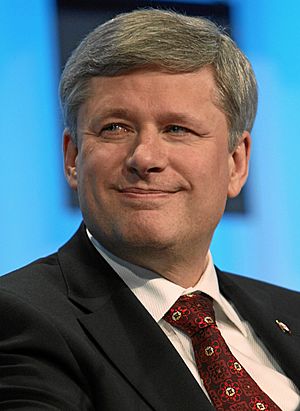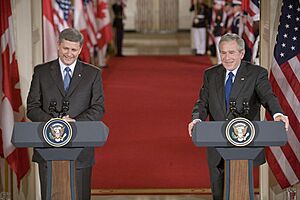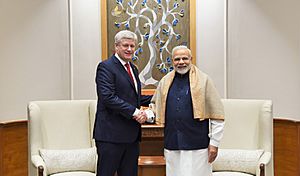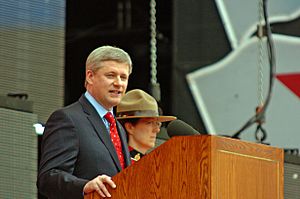Stephen Harper facts for kids
Quick facts for kids
Stephen Harper
|
|||||||||||||||||||||||||||||||||||||||||||||||||||||
|---|---|---|---|---|---|---|---|---|---|---|---|---|---|---|---|---|---|---|---|---|---|---|---|---|---|---|---|---|---|---|---|---|---|---|---|---|---|---|---|---|---|---|---|---|---|---|---|---|---|---|---|---|---|

Harper in 2010
|
|||||||||||||||||||||||||||||||||||||||||||||||||||||
| 22nd Prime Minister of Canada | |||||||||||||||||||||||||||||||||||||||||||||||||||||
| In office February 6, 2006 – November 4, 2015 |
|||||||||||||||||||||||||||||||||||||||||||||||||||||
| Monarch | Elizabeth II | ||||||||||||||||||||||||||||||||||||||||||||||||||||
| Governor General |
|
||||||||||||||||||||||||||||||||||||||||||||||||||||
| Preceded by | Paul Martin | ||||||||||||||||||||||||||||||||||||||||||||||||||||
| Succeeded by | Justin Trudeau | ||||||||||||||||||||||||||||||||||||||||||||||||||||
| Chairman of the International Democracy Union | |||||||||||||||||||||||||||||||||||||||||||||||||||||
| Assumed office February 21, 2018 |
|||||||||||||||||||||||||||||||||||||||||||||||||||||
| Deputy | Brian Loughnane | ||||||||||||||||||||||||||||||||||||||||||||||||||||
| Preceded by | John Key | ||||||||||||||||||||||||||||||||||||||||||||||||||||
|
|||||||||||||||||||||||||||||||||||||||||||||||||||||
| Personal details | |||||||||||||||||||||||||||||||||||||||||||||||||||||
| Born |
Stephen Joseph Harper
April 30, 1959 Toronto, Ontario, Canada |
||||||||||||||||||||||||||||||||||||||||||||||||||||
| Political party | Conservative (since 2003) | ||||||||||||||||||||||||||||||||||||||||||||||||||||
| Other political affiliations |
|
||||||||||||||||||||||||||||||||||||||||||||||||||||
| Spouse | |||||||||||||||||||||||||||||||||||||||||||||||||||||
| Children | 2 | ||||||||||||||||||||||||||||||||||||||||||||||||||||
| Residences | Calgary, Alberta, Canada | ||||||||||||||||||||||||||||||||||||||||||||||||||||
| Alma mater |
|
||||||||||||||||||||||||||||||||||||||||||||||||||||
| Signature |  |
||||||||||||||||||||||||||||||||||||||||||||||||||||
Stephen Joseph Harper (born April 30, 1959) is a Canadian politician. He was the 22nd prime minister of Canada from 2006 to 2015. He was the first leader of the modern Conservative Party of Canada and the only prime minister from that party so far. Since 2018, he has been the chairman of the International Democracy Union.
Harper studied economics at the University of Calgary. He helped start the Reform Party of Canada. In 1993, he was elected to Parliament. He left politics for a few years to lead the National Citizens Coalition, a conservative group.
In 2002, Harper became the leader of the Canadian Alliance party. In 2003, he helped merge his party with the Progressive Conservative Party of Canada. This created the new Conservative Party of Canada, and he became its first leader.
In the 2006 election, Harper's Conservative Party won, and he became prime minister. His government lowered the Goods and Services Tax (GST). In the 2011 election, he won a majority government. This means his party held more than half the seats in Parliament.
During his time as prime minister, his government faced the Great Recession. He also withdrew Canada from the Kyoto Protocol, an international climate agreement. In the 2015 election, the Conservative Party lost to the Liberal Party of Canada, led by Justin Trudeau. Harper then stepped down as party leader.
Contents
Early Life and School
Stephen Harper was born in Toronto, Ontario. He was the oldest of three sons. His father, Joseph, was an accountant for Imperial Oil.
Harper went to public schools in Toronto. He was a good student and was on his school's team for Reach for the Top, a TV quiz show. After high school, he went to the University of Toronto but soon dropped out. He moved to Edmonton, Alberta, and got a job at Imperial Oil.
He later went back to school at the University of Calgary. He earned a bachelor's degree in economics in 1985. He then earned a master's degree in economics in 1991. He was the first prime minister since Pierre Trudeau to have a degree in economics.
Start in Politics
Harper first got into politics in high school. He joined the Young Liberals club. He later changed his mind because he disagreed with the Liberal government's energy policies.
In 1985, he started working for a Progressive Conservative (PC) Member of Parliament (MP), Jim Hawkes. But he soon became unhappy with the PC party's ideas about the economy. He left the party in 1986.
Harper then joined the new Reform Party of Canada. He became the party's chief policy officer. He helped write the party's main platform and created the slogan, "The West wants in!"
In the 1993 election, Harper ran for Parliament again and won. He became an important member of the Reform Party. He was known for his conservative views on the economy and some social issues.
However, Harper often disagreed with the party's leader, Preston Manning. In 1996, he announced he would not run in the next election. He left Parliament in 1997 to lead the National Citizens Coalition, a conservative group.
Leader of the Opposition
In 2002, Harper became the leader of a new party called the Canadian Alliance. He returned to Parliament as the Leader of the Official Opposition.
Harper wanted to unite Canada's two main conservative parties. In 2003, he and PC leader Peter MacKay agreed to merge their parties. They formed the Conservative Party of Canada. In 2004, Harper was elected its first leader.
In the 2004 election, the Conservatives lost to the Liberal Party, led by Paul Martin. But in 2005, the Liberal government became weak due to a scandal. Harper's party, along with other opposition parties, voted to defeat the government. This led to a new election in 2006.
Prime Minister of Canada (2006–2015)

In the 2006 election, the Conservatives won the most seats. Harper became the 22nd prime minister of Canada. At first, he led a minority government. This meant he needed support from other parties to pass laws.
In the 2008 election, the Conservatives won more seats but still had a minority. Later that year, the opposition parties planned to vote against his government. To avoid this, Harper asked the Governor General to prorogue, or pause, Parliament. This was a controversial move.
In 2011, Harper's government was defeated in a no-confidence vote. This happened after it was found in "contempt of Parliament" for not sharing information. This triggered the 2011 election.
This time, the Conservatives won a majority government. They could now pass laws without support from other parties. The election also made the New Democratic Party the Official Opposition for the first time.
In the 2015 election, the Conservatives were defeated by Justin Trudeau's Liberal Party. Harper resigned as party leader but remained a Member of Parliament for his riding of Calgary Heritage.
Major Policies and Events
As prime minister, Harper's government made several key changes.
- Taxes: It lowered the Goods and Services Tax (GST) from 7% to 5%. It also created the tax-free savings account (TFSA).
- Economy: During the Great Recession of 2008, his government created an "Economic Action Plan." This plan included tax cuts and spending on projects to help the economy.
- Environment: In 2011, the government announced that Canada would leave the Kyoto Protocol. This was an international treaty to reduce greenhouse gas emissions.
- Foreign Policy: Harper was a strong supporter of Israel. He also sent the Canadian military to take part in operations in Afghanistan and Libya.
- Quebec: In 2006, Parliament passed a motion introduced by Harper. It recognized that "the Québécois form a nation within a united Canada."
Life After Politics

Harper resigned from Parliament in August 2016. He started a consulting company called Harper & Associates.
In 2018, he became the chairman of the International Democracy Union. This is a global group of centre-right political parties. He has also written a book called Right Here, Right Now. In the book, he shares his thoughts on politics and leadership.
Harper sometimes comments on current events. He has spoken about trade, foreign policy, and Canadian politics. In 2022, he supported Pierre Poilievre for the leadership of the Conservative Party.
Personal Life

Harper married Laureen Teskey in 1993. They have two children, Benjamin and Rachel.
He is a big fan of ice hockey, especially the Toronto Maple Leafs. He even wrote a book about the history of hockey called A Great Game.
Harper also enjoys music. He plays the piano and is a fan of bands like The Beatles. In 2009, he surprised an audience by singing and playing the piano at a concert with the famous cellist Yo-Yo Ma.
Honours
- In 2019, Harper was made a Companion of the Order of Canada. This is one of Canada's highest civilian honours.
- He received the Queen Elizabeth II Golden Jubilee Medal in 2002 and the Queen Elizabeth II Diamond Jubilee Medal in 2012.
- In 2011, he was made an Honorary Chief of the Kainai Nation (Blood Tribe) in Alberta. This was to recognize his official apology for the residential schools system.
- He has received several international awards for his public service and support for Israel.
See also
 In Spanish: Stephen Harper para niños
In Spanish: Stephen Harper para niños
- 28th Canadian Ministry The Harper cabinet
- List of prime ministers of Canada
- List of prime ministers of Elizabeth II
- Canada–United States softwood lumber dispute
- Conservative Party of Canada
- Reform Party of Canada
- Canadian Alliance
- Conservatism in Canada
- Canada's Global Markets Action Plan
 | Calvin Brent |
 | Walter T. Bailey |
 | Martha Cassell Thompson |
 | Alberta Jeannette Cassell |

